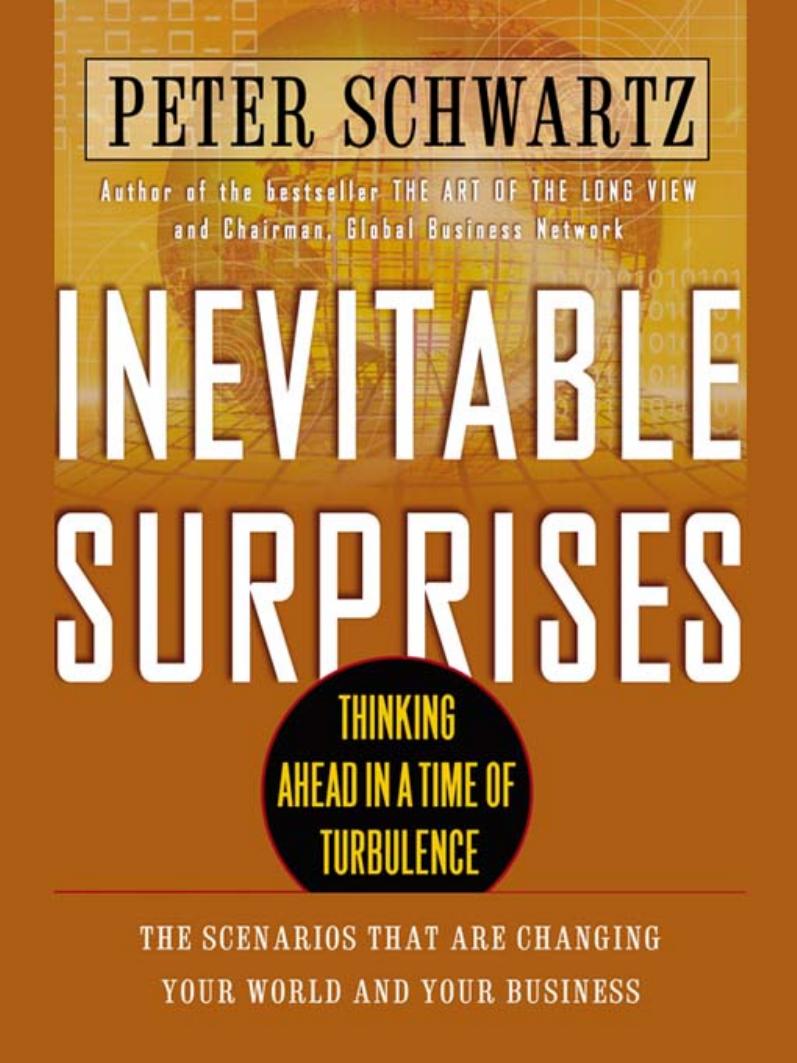Inevitable Surprises by Peter Schwartz

Author:Peter Schwartz [Schwartz, Peter]
Language: eng
Format: epub, pdf
ISBN: 9781101216552
Publisher: Penguin Publishing Group
Published: 2004-05-24T00:00:00+00:00
The Return of Public Faith in Government
Why havenât nations like Argentina and the Phillipines shared in this move toward orderly prosperity? Preeminently, both Argentina and the Phillipines have missed out on a significant intellectual trend underlying the resurgence of the orderly nations: the return of public faith in government.
In his book The Cycles of American History Arthur Schlesinger, Jr., describes how fashions of opinion have swept across American government in a recurring debate: Which is the most effective way to run an economyâwith relatively free markets, or with relatively strong government controls? Daniel Yergin and Joseph Stanislaw trace a similarly recurring intellectual debate on a worldwide level in their book The Commanding Heights. The balance clearly swung toward free markets in the 1980s and 1990s, and now it has begun to swing back. People have faith in government again.
Some symptoms of this: Belief in deregulation and privatization has declined. The âWashington consensusâ (a set of policies in Latin America aimed at privatizing industry and eliminating government services) has been discredited. Corporations have been shown, once again, to be vulnerable to internal corruption unless they are regulated. Even the terrorist attacks have reinforced this, by making people feel, more fervently than ever, that they need some kind of government presence to protect them. George W. Bush, a Republican president elected with an unabashedly antigovernment message, is the first president to create a new government agency (the Department of Homeland Defense) in thirty years. These swings are never complete, and the pendulum will move back again. But this time, in part because of the orderly nations, we can expect faith in government to be more significant, and perhaps to last longer.
Though few people see it, I am convinced of another inevitable surprise on the horizon: The old argument between âgovernment interventionâ and âfree marketsâ will grow increasingly irrelevant in the future. Weâve learned over the course of the last twenty years that it doesnât matter whether the market or the state is in charge. Both are always in charge, anyway. What matters is the competence brought by the particular people trying to do a task, whether they work for a private corporation, a government agency, or even a nonprofit. If you have competent, civic-minded corporations or if you have competent, efficient-minded governments (like Germany) and they are capable in both instances of doing what they intend, then youâre likely to get good, efficient infrastructure and services.
The orderly nations are putting this to the test. Because there are so many of them, and because the international rule of law makes them more transparent than they used to be, people can see effectiveness in action. Because of the freedom of migration, people are literally voting with their feet to move to the more socially and economically effective regions. Migration will be particularly important in Europe and China, where the local governments (in Europeâs case, the national governments) have a great deal of autonomy but people can easily move from one polity to another. And
Download
This site does not store any files on its server. We only index and link to content provided by other sites. Please contact the content providers to delete copyright contents if any and email us, we'll remove relevant links or contents immediately.
Rich Dad Poor Dad by Robert T. Kiyosaki(6633)
Bad Blood by John Carreyrou(6621)
Principles: Life and Work by Ray Dalio(6449)
Playing to Win_ How Strategy Really Works by A.G. Lafley & Roger L. Martin(6306)
Management Strategies for the Cloud Revolution: How Cloud Computing Is Transforming Business and Why You Can't Afford to Be Left Behind by Charles Babcock(4573)
The Confidence Code by Katty Kay(4260)
Thinking in Bets by Annie Duke(4227)
American Kingpin by Nick Bilton(3887)
Delivering Happiness by Tony Hsieh(3426)
Project Animal Farm: An Accidental Journey into the Secret World of Farming and the Truth About Our Food by Sonia Faruqi(3221)
The Power of Habit by Charles Duhigg(3139)
The Tyranny of Metrics by Jerry Z. Muller(3073)
The Marketing Plan Handbook: Develop Big-Picture Marketing Plans for Pennies on the Dollar by Robert W. Bly(3063)
Brotopia by Emily Chang(3056)
Mastering Bitcoin: Programming the Open Blockchain by Andreas M. Antonopoulos(3045)
I Live in the Future & Here's How It Works by Nick Bilton(2997)
The Content Trap by Bharat Anand(2927)
Building a StoryBrand by Donald Miller(2915)
Applied Empathy by Michael Ventura(2904)
